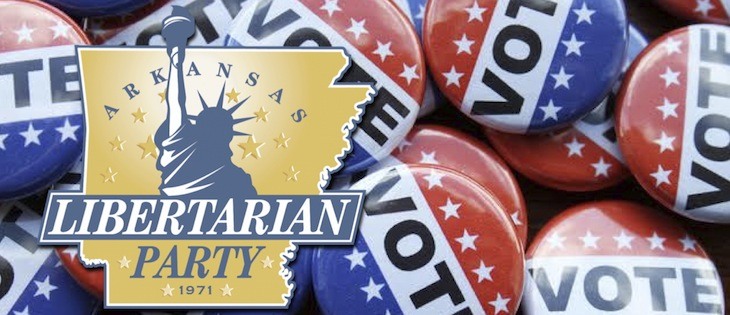State third party election law declared unconstitutional, appeal being mulled
by October 3, 2022 5:42 pm 1,193 views

A district judge has ruled that Arkansas’ 56 Libertarian Party candidates qualified for this year’s ballot, but the state could still appeal for future elections, and if it does, the incoming Senate president pro tempore expects it to win.
In an 83-page decision, U.S. District Judge Kristine Baker ruled Sept. 30 that an Arkansas law passed in 2019 violated the Libertarian Party of Arkansas’ 1st and 14th Amendment rights. The case was Libertarian Party of Arkansas v. John Thurston, who is secretary of state.
Act 164 of 2019 increased the required number of valid signatures “new” parties must collect from 10,000 to 3% of the total number of votes in the previous governor’s race. For this election cycle, the Libertarians would have had to submit 26,746 valid signatures, which is more than they did.
A “new” party is any party that did not win 3% of the vote in the preceding governor’s race or president’s race, whichever is most recent. The Libertarian candidate for president in 2020, Jo Jorgensen, received 1% of the vote in 2020. The law also limited third parties’ signature-collecting process to 90 days and moved the dates for submitting signatures and certifying candidates to earlier in the year before the election.
Baker wrote that the law’s provisions “collectively impose a severe burden on plaintiffs’ rights under the First and Fourteenth Amendments and that the State of Arkansas is unable to demonstrate that the statutes are narrowly drawn to serve a compelling state interest.”
Thurston spokesman Chris Powell said his office was still conferring with the attorney general’s office about whether to appeal. Gov. Asa Hutchinson told the Arkansas Democrat-Gazette that he was reviewing the case and would assess whether to appeal.
Dr. Michael Pakko, the Libertarian Party of Arkansas chairman, said in an interview that the Legislature needs to address the gap that now exists in Arkansas’ election law. Asked if the Legislature would alter the law when it next meets in 2023, Sen. Bart Hester, R-Cave Springs, the incoming Senate president pro tempore, wrote in a text, “Judge Baker will get overruled as is a matter of routine practice for her rulings.”
Baker had issued a preliminary injunction in the case in 2019, a decision that later was affirmed by the Eighth U.S. Circuit Court of Appeals.
Pakko said the combination of new requirements included in the law made it especially burdensome for Libertarians to collect the required number of signatures. The 10,000-signature requirement was put into law in 2007. After that, Libertarians qualified for elections starting in 2012. The Green Party qualified for the ballot from 2008 to 2014.
Under Act 164, new parties are required to be recognized 60 days before the filing period. For this election cycle, that was Dec. 24, 2021, which is 319 days before the general election and five months before Republicans and Democrats held their primary elections. In the next election cycle, the signature deadline would be even earlier – Sept. 7, 2023. The Libertarians argued that the early deadlines came long before elections when voters are less interested.
Libertarians favor greatly reducing the scope and role of government. They would drastically reduce government spending on social programs, and they also support gun rights, gay rights, and legalizing marijuana.
Pakko said there’s a perception that Libertarians take more votes from Republicans than Democrats. He said he hasn’t seen evidence that is the case. He said he believes the party gets votes from people who otherwise would not vote, and then the rest come from people who would have voted for both Republicans and Democrats.
The party has yet to elect a candidate to a significant office in Arkansas, but he said its presence raises issues that might otherwise be ignored. He hopes the party can be more competitive as its credibility and name identification grows.
“I think our democracy would be a lot more healthy if we had more than two competing parties bashing heads all the time,” he said.
Pakko testified in court that the party has spent $30,000 to collect signatures, in addition to the volunteer effort.
The party could avoid the signature requirement if its candidate for governor, Ricky Dale Harrington, wins 3% of the vote in November. Harrington received 33.5% of the vote as Sen. Tom Cotton’s only opponent in the 2020 U.S. Senate race. The party’s best finish in a governor’s race came in 2018 when Mark West won 2.9%, falling 861 votes short of the 3% mark.
Among the arguments made by the state was that the law would keep the ballot from becoming too cluttered. But Pakko said there is no evidence that the ballot is cluttered now. Many legislative races are uncontested or feature only a Libertarian running against a major party candidate.
The party has candidates for governor, U.S. Senate, three congressional races, lieutenant governor and state auditor. It also has nine candidates for state Senate and 31 for the state House.
Pakko said the law’s provisions “were really intended to keep other parties off the ballot and to limit competition in the electoral process.” In 2019, the law passed the Senate before he had the chance to testify. Pakko noted that because this is a civil rights case, the Libertarian Party’s legal fees would be paid by the state, in addition to the costs the state has incurred in its own defense.
